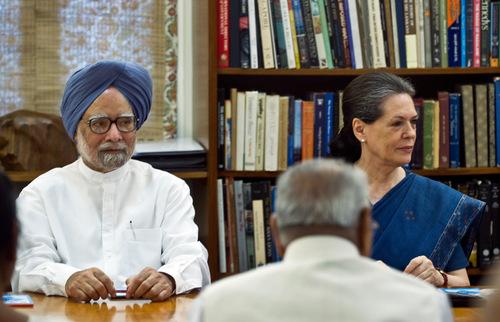Manmohan Singh takes the reins as India’s finance minister
Indian Prime Minister Manmohan Singh (L) and Congress Party President Sonia Gandhi attend the Congress Working Committee (CWC) meeting in New Delhi on June 25, 2012.
Indian Prime Minister Manmohan Singh took the reins as India's finance minister this week as the much-criticized Pranab Mukherjee was promoted out to become the country's figurehead president — a post many say he was offered as a kind of golden handshake. (Great job: Now buzz off!)
So what does the economist PM — known for rebooting India's economy and beginning the era of liberalization in 1991 — need to do to make good?
The Wall Street Journal offers a five-point wishlist:
1. Get Infrastructure Projects Rolling.
Were they easier to get invest in and less mired in red tape, these projects could draw a lot of foreign investment. And India needs better roads and ports to grow.
Likelihood of success? Dim.
India has been talking about speeding up infrastructure projects for the past decade, and the only guy who has been able to do it is E. Sreedharan, the dude who built the Delhi Metro.
2. Cap Government Spending.
For an economist, Singh has been a profligate spender, funding costly programs to protect the poor from the inflation associated with India's rapid growth. But with the deficit at 5.8% of GDP, government spending has crowded out private investment, fueled inflation, and caused ratings agencies to warn that a credit downgrade is imminent, says WSJ. Their recommendations: Hike domestic prices for diesel and kerosene.
Likelihood of success? Dim.
Singh's move to hike petrol prices earlier this summer looked like he was drawing a line in the sand — answering skeptics who criticized him for "policy paralysis." But he didn't follow it up with other fuel hikes then, and was forced to reduce the price increase by public protests.
3. Bring Inflation Under Control.
The WSJ recommends breaking up cartels that buy from farmers at cheap prices and then hoard produce to inflate prices, given that improving infrastructure isn't happening anytime soon (See point 1).
Likelihood of success? Doable.
In every other respect, India's farm and rural policy is all about government intervention. And this is a proposal that's politician friendly, because it could help masses of voters — farmers AND people who eat.
4. Open Up Protected Sectors.
"India needs to immediately open up protected sectors such as retail, civil aviation and financial services to foreign investors," writes WSJ. "Yada yada yada yada."
Likelihood of success? Doable… and undoable.
Every few weeks somebody fools me and the rest of the press pool into writing a story about the opening of the retail sector to foreign investment from big-box stores like Walmart. It even happened once. And then it unhappened in a few days, after Singh's political allies threatened to bring down the government. The good news? It can be accomplished by fiat, without any new piece of legislation.
5. Support Exporters.
According to WSJ, India should "Set up industry-specific manufacturing zones with tax breaks and expedited land and environment clearances." But according to my memory this has already been done, the various states are always engaged in a race to the bottom anyway, and environmental clearances are for sale for a nominal bribe (by corporate standards). Moreover, if a 30 percent-odd drop in the price of the rupee over the past few years isn't stimulus enough for the export industry, I'm not sure they can make money under any circumstances. (Yes: I was getting 40 rupees for the dollar not too long back; now it's 56-57).
Likelihood of success? Sure.
It doesn't seem to make any sense, so it'll probably get done. But that's OK. For if there's one piece of advice that the new finance minister needs to heed, it's this little piece of folk wisdom:
Do something, even if it's wrong.
The story you just read is accessible and free to all because thousands of listeners and readers contribute to our nonprofit newsroom. We go deep to bring you the human-centered international reporting that you know you can trust. To do this work and to do it well, we rely on the support of our listeners. If you appreciated our coverage this year, if there was a story that made you pause or a song that moved you, would you consider making a gift to sustain our work through 2024 and beyond?
